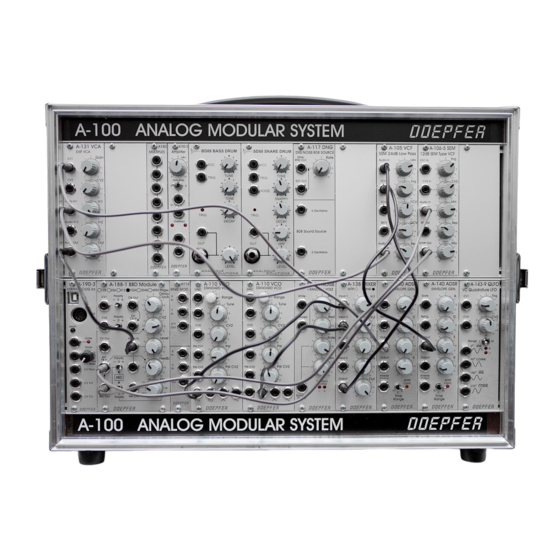- ページ 12
コントロールユニット DOEPFER A-100 SeriesのPDF マニュアルをオンラインで閲覧またはダウンロードできます。DOEPFER A-100 Series 16 ページ。 Analog modular system, connecting the breakout module to the main module
DOEPFER A-100 Series にも: 取扱説明書 (8 ページ), ユーザーマニュアル (12 ページ), 組立・配線マニュアル (6 ページ), マニュアル (8 ページ), マニュアル (8 ページ), マニュアル (6 ページ), 接続 (8 ページ)

DOEPFER
DOEPFER
DOEPFER
DOEPFER
)
Single Outputs
The six sockets ) are the "raw" outputs (taps) of the BBD
stages 3328, 2790, 1726, 1194, 662 and 396. These
outputs can be used e.g. for for feedback patching, for
external mixing (e.g. with a voltage controlled mixer) or for
multi-channel applications (e.g. 5.1 sounds).
1
1
a,
b :
mix levels/polarities of the BBD taps
3328, 2790, 1726, 1194, 662 and 396
(polarizers)
2
2
a,
b Mix:
wet/dry controls for outputs 1 and 2
1/2
(
1/2
(
/
Output 1:
mixed audio output 1
(
Output 2:
mixed audio output 2
This group of elements is responsible for the two mixed
outputs appearing at the sockets / Output 1 and ( Output
2. In the left/ccw position of the knobs 2a/b Mix the original
signal appears at the sockets //(. In the right/cw position of
the knobs 2a/b Mix the internal pre-mix signal composed
from the the six BBD taps with the polarizers
at the sockets //(. In the intermediate positions of the
knobs 2a/b Mix a mix of these two signals appears at the
corresponding output socket.
a are assigned to sub-mixer 1)
b are assigned to sub-mixer 2)
1
a/b appears
System A-100
&
Ext.FB In:
6
Feedback:
This group of elements is responsible for the feedback
functions of the module. Socket & Ext.FB In is the input of
the feedback loop and is normalled to socket ) BBD Out
396. Patching the feedback socket to any of the other single
output sockets another BBD tap can be used for the
feedback function to a obtain different sound. If an external
module is used to control the feedback loop (e.g. a VCA or
VC polarizer) the module has to be inserted between one of
the six sockets ) BBD Out and socket & Ext.FB In. The
feedback control
position at the center. Left from the center the feedback
signal is subtracted from the input signal, right from the
center it's added (negative/positive feedback). The polarity
of the feedback signal leads to clearly audible different
sounds especially at short delay times as different
frequencies are emphasized or attenuated for positive or
negative feedback. For longer delay times ("analog delay"
application) the sound differences are much smaller
In the fully right/cw or fully left/ccw position of the feedback
6
control
the module goes into self-oscillation. As already
mentioned in chapter 2 the result in the self-oscillation state
depends upon the "audio history" (for details please refer to
page 7).
BBD Module A-188-2
external feedback input
feedback level and polarity control
(polarizer)
6
Feedback is a polarizer with the neutral
12
